Related Research Articles

"Love Is Strange" is a crossover hit by American rhythm and blues duet Mickey & Sylvia, which was released in late November 1956 by the Groove record label.
Instrumental rock is rock music that emphasizes musical instruments and features very little or no singing. Examples of instrumental rock can be found in practically every subgenre of rock, often from musicians who specialize in the style. Instrumental rock was most popular from the mid-1950s to mid-1960s, with artists such as Bill Doggett Combo, The Fireballs, The Shadows, The Ventures, Johnny and the Hurricanes and The Spotnicks. Surf music had many instrumental songs. Many instrumental hits had roots from the R&B genre. The Allman Brothers Band feature several instrumentals. Jeff Beck also recorded two instrumental albums in the 1970s. Progressive rock and art rock performers of the 1960s and 1970s did many virtuosic instrumental performances.
The 26th Annual Grammy Awards were held on February 28, 1984, at Shrine Auditorium, Los Angeles, and were broadcast live on American television. They recognized accomplishments by musicians from the year 1983. Michael Jackson, who had been recovering from scalp burns sustained due to an accident that occurred during the filming of a Pepsi commercial, won a record eight awards during the show. It is notable for garnering the largest Grammy Award television audience ever with 51.67 million viewers.

"Let's Stay Together" is a song by American singer Al Green from his 1972 album of the same name. It was produced and recorded by Willie Mitchell, and mixed by Mitchell and Terry Manning. Released as a single in 1971, "Let's Stay Together" reached number 1 on the Billboard Hot 100, and remained on the chart for 16 weeks and also topped Billboard's R&B chart for nine weeks. Billboard ranked it as the number 11 song of 1972.
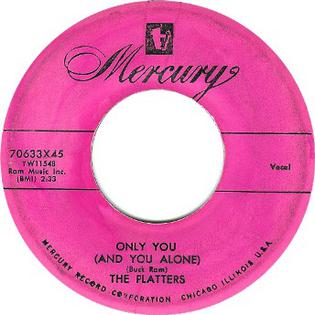
"Only You " is a pop song composed by Buck Ram. It was originally recorded by The Platters with lead vocals by Tony Williams in 1955.
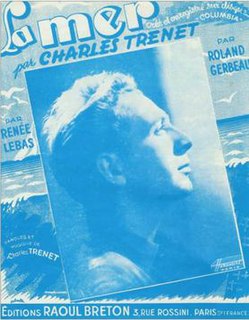
"Beyond the Sea" is the English-language version of the French song "La Mer" by Charles Trenet, popularized by Bobby Darin in 1959. While the French original was an ode to the sea, Jack Lawrence – who composed the English lyrics – turned it into a love song.
"Because of You" is a popular song, written by Arthur Hammerstein and Dudley Wilkinson in 1940. It was used in the 1951 film I Was an American Spy.

Shaft is a double album by Isaac Hayes, recorded for Stax Records' Enterprise label as the soundtrack LP for Metro-Goldwyn-Mayer's 1971 blaxploitation film Shaft. The album mostly consists of instrumentals composed by Hayes as score for the film. Three vocal selections are included: "Soulsville", "Do Your Thing", and "Theme from Shaft". A commercial and critical success, Shaft is Hayes' best-known work and the best-selling LP ever released on a Stax label.

"Do You Love Me" is a rhythm and blues song recorded by the Contours in 1962. Written and produced by Motown Records owner Berry Gordy Jr., it appeared twice on the Billboard Hot 100 chart, reaching numbers three in 1962 and eleven in 1988.

"A House Is Not a Home" is a 1964 ballad recorded by American singer Dionne Warwick, and written by the team of Burt Bacharach and Hal David for the 1964 film of the same name, starring Shelley Winters and Robert Taylor. The song was a modest hit in the United States for Warwick, peaking at #71 on the pop singles chart as the B-side of the top 40 single, "You'll Never Get to Heaven ". Another version of the song, by Brook Benton, which was the version that appeared in the film, was released at nearly the same time. It debuted two weeks earlier on the Billboard Hot 100. Benton's version split airplay with Warwick's, and ultimately peaked at #75.
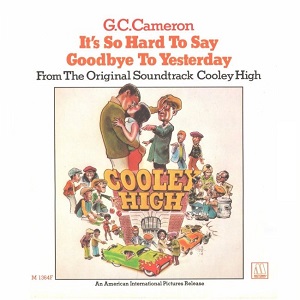
"It's So Hard to Say Goodbye to Yesterday" is an R&B song written by Motown husband-and-wife songwriting team Freddie Perren and Christine Yarian for the 1975 film Cooley High. In the film, the song is performed by Motown artist G.C. Cameron, whose rendition peaked at number 38 on the Billboard R&B singles chart that same year. Perren also composed the instrumental score for Cooley High, and the B-side to "It's So Hard to Say Goodbye to Yesterday" features two of his score compositions from the film.

"Pimpin' All Over the World" is a song by American rapper Ludacris featuring singer Bobby Valentino. The song was released on May 16, 2005, as the fourth and final single from Ludacris's fourth studio album, The Red Light District (2004), and was produced by Polow da Don and Donnie Scantz. The track features Ludacris rapping the verses and Valentino on the chorus. "Pimpin' All Over the World" reached number nine on the US Billboard Hot 100 and number two on the Billboard Hot Rap Tracks chart. The song includes a cameo from comic Katt Williams as well as additional vocals from Keri Hilson.

"Turn On Your Love Light" is a rhythm and blues song recorded by Bobby Bland in 1961. It was both an important R&B and pop chart hit for Bland and has become one of his most identifiable songs. A variety of artists have recorded it, including the Grateful Dead, who made it part of their concert repertoire.
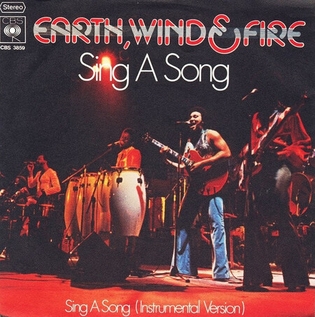
"Sing a Song" is a song recorded by R&B/funk band, Earth, Wind & Fire, which was issued as a single in November 1975 on Columbia Records. The song reached No. 1 on the Billboard Hot Soul Singles chart and No. 5 on the Billboard Hot 100.

"Hold On, I'm Comin'" is a 1966 single recorded by soul duo Sam & Dave, issued on the Atlantic-distributed Stax label in 1966.

"Get Money" is the third and final single, "Player's Anthem" having been the first, released from New York rap group Junior M.A.F.I.A.'s debut or August 1995 album, Conspiracy. "Get Money," whose instrumental is fundamentally a sample of R&B singer Sylvia Striplin's 1981 song "You Can't Turn Me Away," was produced by EZ Elpee, rapped by the Notorious B.I.G. and Lil' Kim, and received a music video. B.I.G., formally, was featured, but at times was deemed, like Lil' Kim and Lil' Cease, a Junior M.A.F.I.A. member.
"Space Race" is an instrumental track by Billy Preston, released as a single in 1973 on the A&M label, taken from Preston's 1973 album Everybody Likes Some Kind of Music. "Space Race" was a gold record.
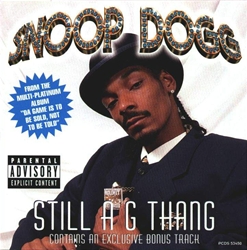
"Still a G Thang" is a song by American rapper Snoop Dogg. It was released on July 3, 1998 as the first single of his third studio album Da Game Is to Be Sold Not to Be Told, with the record labels; No Limit Records and Priority Records. It was produced by Meech Wells. It is the sequel to the 1992 hit single "Nuthin' but a 'G' Thang", which appears on Dr. Dre's debut solo album, The Chronic (1992).

"Flava in Ya Ear" is the debut single by American rapper Craig Mack, from his album Project Funk da World. The original club mix single was released on 12" vinyl in July 1994 on the Bad Boy Entertainment record label, packaged with a series of additional remixes. Most famously, there was a remix of the song that featured verses from the Notorious B.I.G., LL Cool J, Rampage and Busta Rhymes. Music videos were produced for both the original song and the remix.
References
- ↑ Galloway, A. Scott (1994). Rock Instrumental Classics Volume 4: Soul (p. 14) [CD booklet]. Los Angeles: Rhino Records.